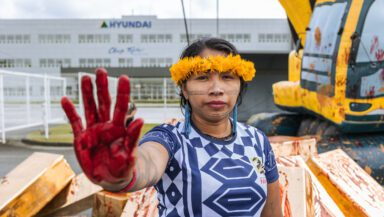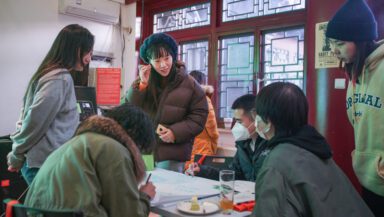Bitung North Sulawesi, Indonesia 25 September 2018 – For twelve hours Greenpeace volunteers occupied a palm oil refinery belonging to Wilmar International, the world’s largest palm oil trader and supplies major brands including Colgate, Mondelez, Nestlé and Unilever.
The refinery, which is on the Indonesian island of Sulawesi, was processing palm oil from major producers that are destroying rainforests in Kalimantan and Papua, Indonesia. [1]
Kiki Taufik, head of Greenpeace’s global Indonesia forests campaign, said:
“Wilmar has been promising to clean up its supply chain since 2013. Yet it is still buying palm oil from forest destroyers. It is not Greenpeace’s responsibility to police their supply chain. Wilmar should only buy palm oil from producers it can prove are clean. That is what Wilmar CEO Kuok Khoon Hong promised almost five years ago,”
The Greenpeace team [2] included thirty volunteers and climbers from Indonesia, Malaysia, the Philippines, Thailand, the UK, France and Australia. One group climbed the anchor chain of a tanker ship transporting palm oil and prevented it from moving. Another group scaled the refinery and painted “DIRTY” in 5 metre high letters on the storage tanks. They were accompanied by the Indonesian rock band Boomerang, who performed their new single from the top of the storage tanks.
In 2013, Wilmar became the first palm oil trader to adopt a ‘no deforestation, no peat, no exploitation’ policy. Last week, a Greenpeace International investigation revealed that 25 palm oil producers had cleared 130,000ha of rainforest since 2015. [3] Wilmar was buying from 18 of those palm oil groups; three supplied the refinery where the protest is taking place. Only a fraction of the palm oil Wilmar trades comes from its own plantations; more than 80 percent comes from other palm oil producers.
Dal Payne, a climber from the UK who took part in the action said:
“We occupied Wilmar’s dirty palm oil refinery from dawn to dusk stopping it sending that palm oil to brands around the world. The message to brands like Unilever, Nestlé and Mondelez is simple: listen to your customers and cut Wilmar off until it can prove its palm oil is clean.”
Greenpeace is calling on Wilmar to prove it no longer sources palm oil from forest destroyers. The first step is to requiring all producer groups in its supply chain to publish mill location data and concession maps for their entire operations and to cut off any that refuse.
Palm oil impacts on environment, people and climate
- Wilmar International and other palm oil groups are regularly accused of exploiting workers, children and local communities.
- The plantation sector – palm oil and pulp – is the single largest driver of deforestation in Indonesia. Around 24 million hectares of rainforest was destroyed in Indonesia between 1990 and 2015, according to official figures released by the Indonesian government.
- Deforestation and peatland destruction are major sources of greenhouse gas emissions which contribute to climate change. This has pushed Indonesia into the top tier of global emitters, alongside the United States of America and China.
- Plantation development is a root cause of Indonesia’s forest and peatland fires. In July 2015, devastating blazes spread in Sumatra, Kalimantan and Papua. These fires produced a haze that affected millions of people across Southeast Asia. Researchers at Harvard and Columbia Universities estimate that the smoke from 2015 Indonesian fires may have caused 100,000 premature deaths. The World Bank calculated the cost of the disaster at US$16bn.
ENDS
Photos and video are available HERE
Notes
[1] The protest is taking place at Wilmar’s PT Multi Nabati Sulawesi refinery in Bitung, North Sulawesi.
[2] The action was coordinated by Greenpeace Southeast Asia
[3] Greenpeace International used satellite imagery to identify 130,000ha of deforestation by 25 producer groups since 2015. 51,600ha (40%) was in Indonesian Papua with a further 26,100ha (20%) in neighbouring Papua New Guinea – some of the most biodiverse regions on earth and until recently untouched by the palm oil industry.
When Greenpeace International approached Wilmar about these producer groups, it confirmed that it was sourcing from 18 of the producer groups. It subsequently stopped sourcing from several of the groups.
According to supply chain data published by Wilmar, 3 of the producer groups named in the Greenpeace International investigation – Central Cipta Murdaya, Gama and the Fangiono family – supplied palm to PT Multi Nabati Sulawesi in 2017, the most recent period for which data is available.



